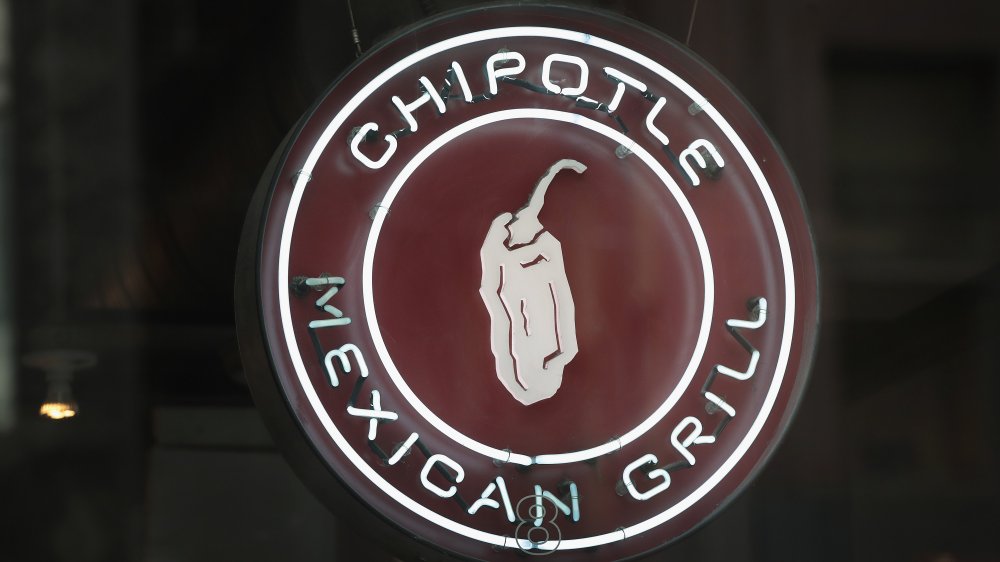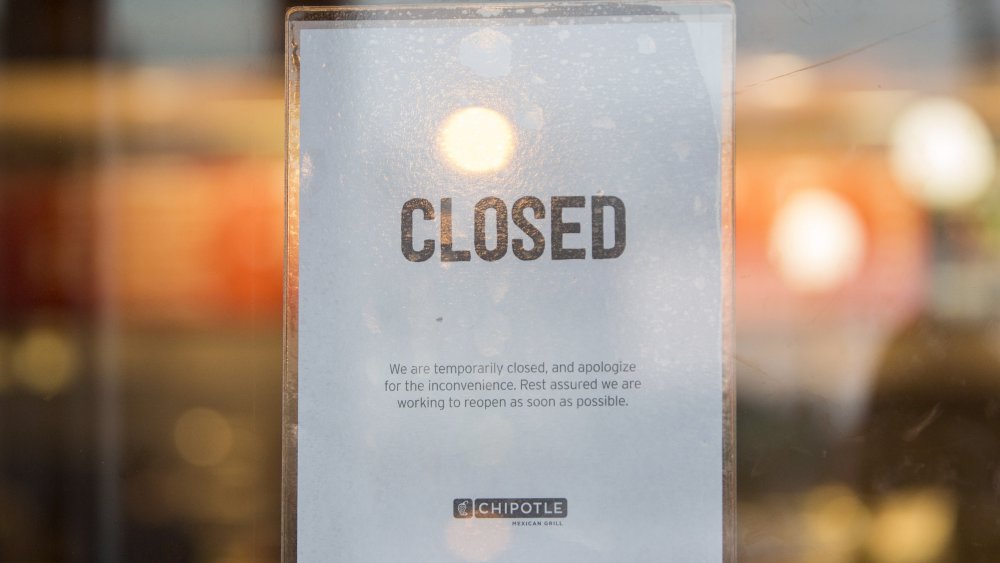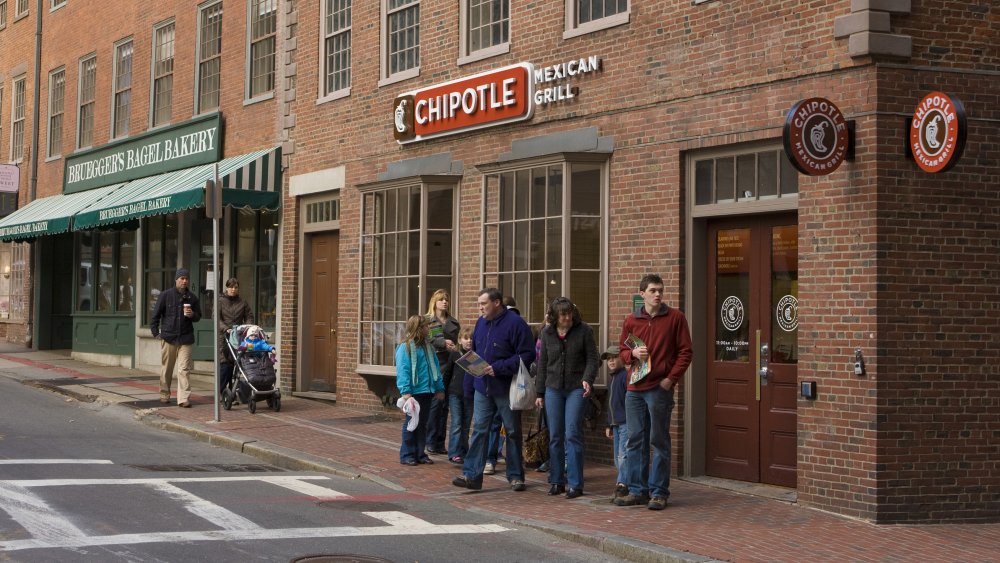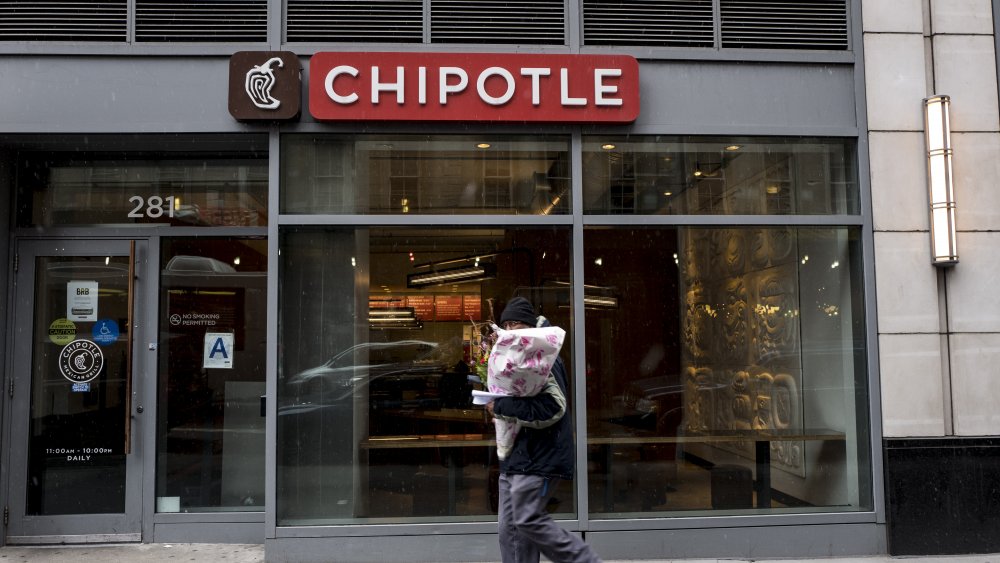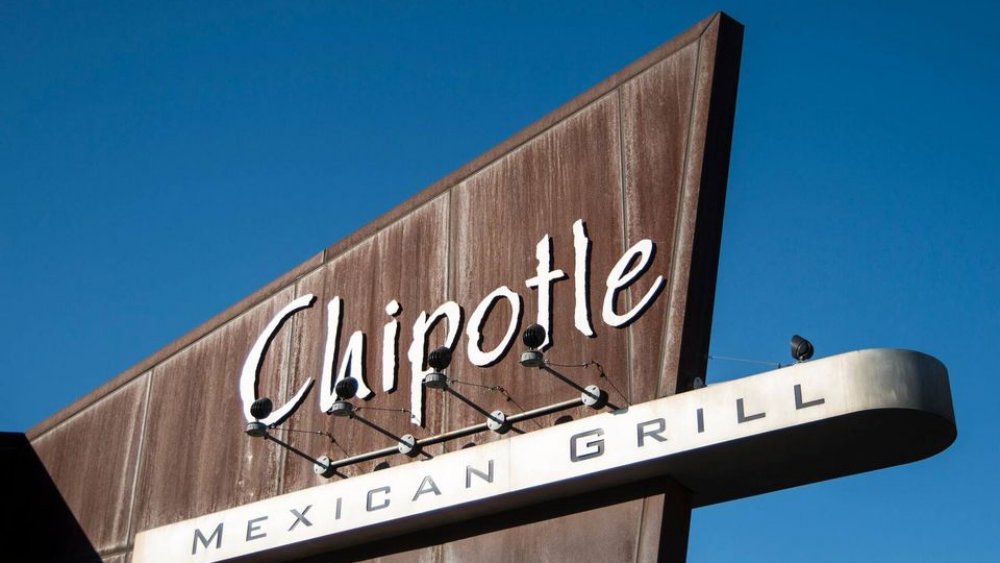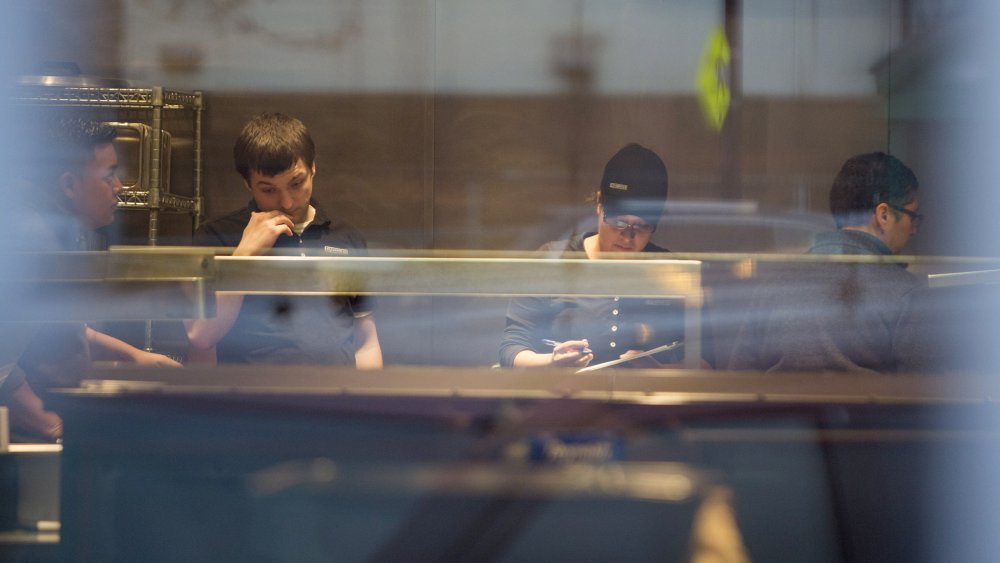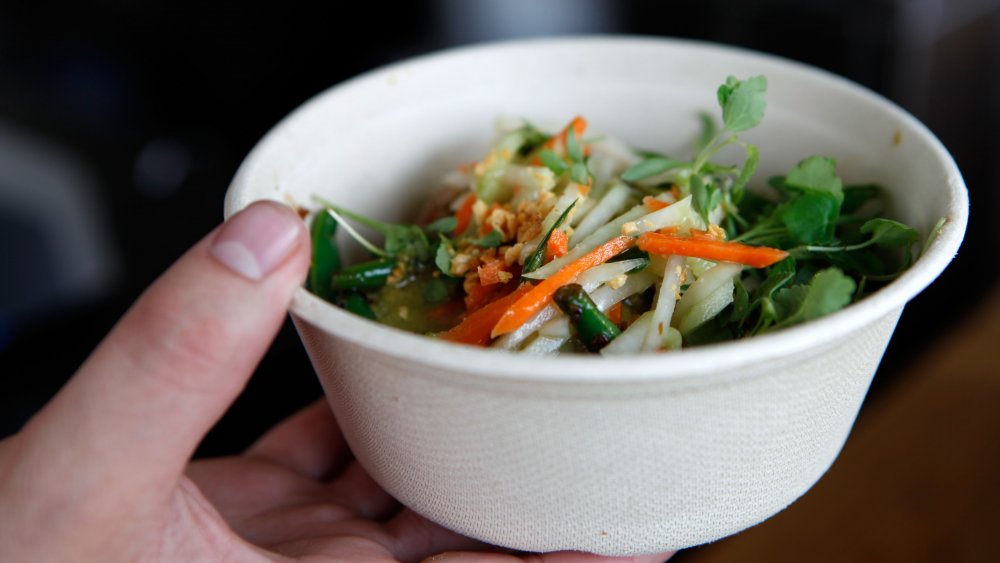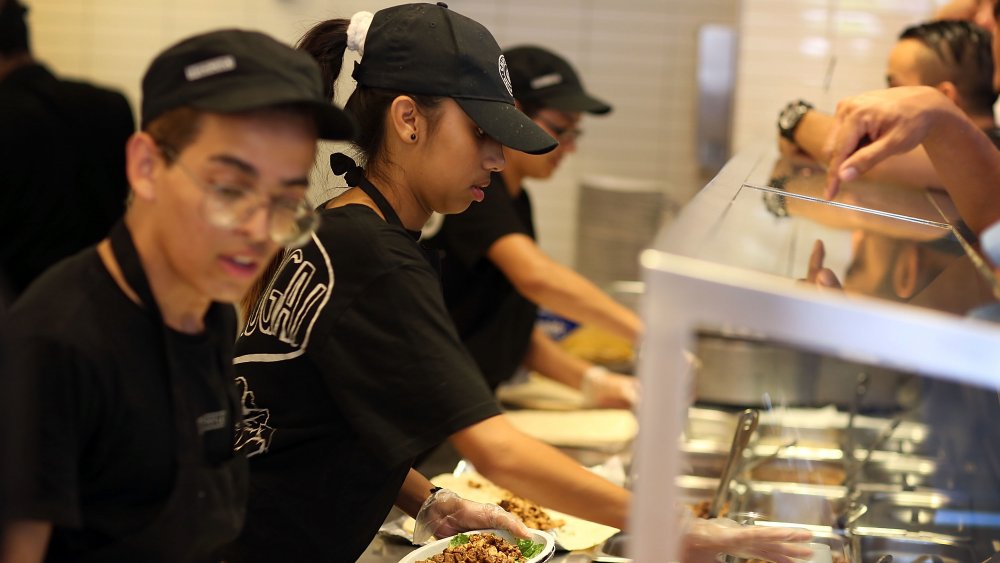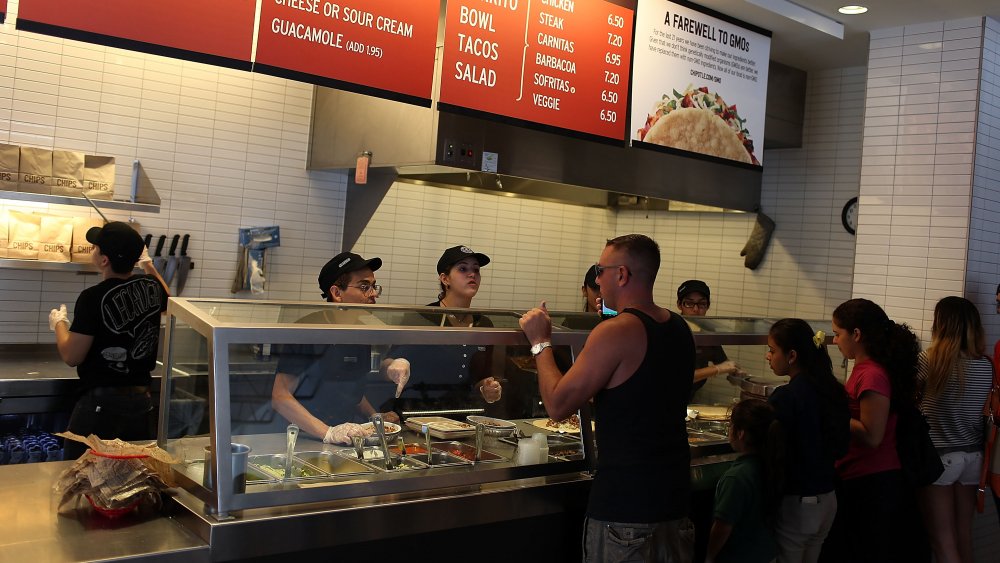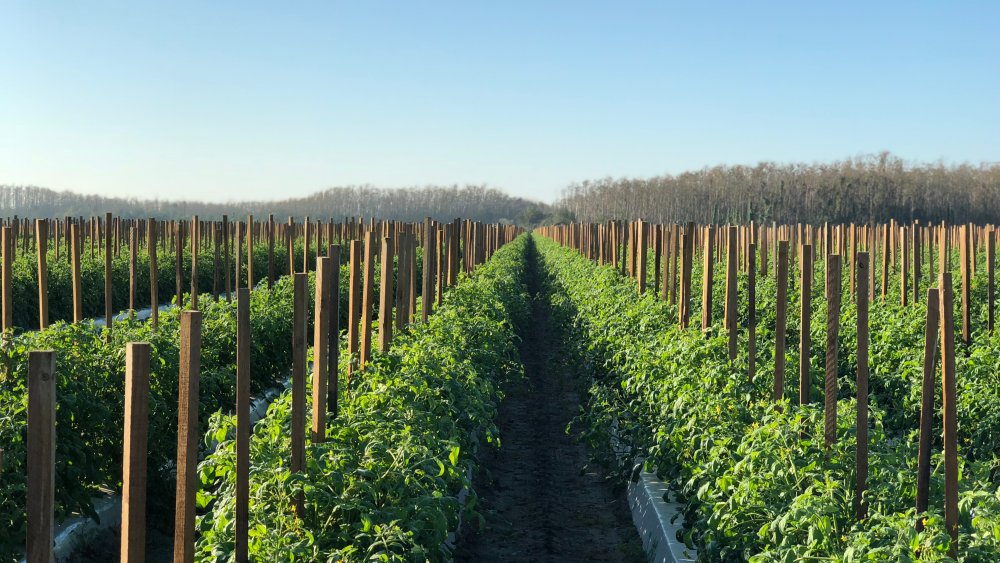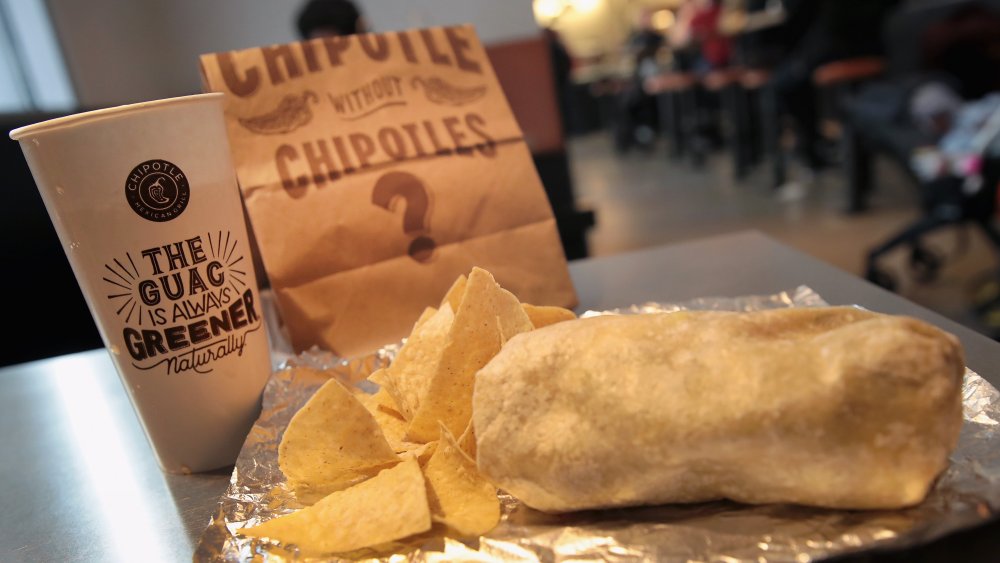Scandals Chipotle Can Never Live Down
Chipotle is one of America's best-loved fast food restaurants. Ever since opening back in 1993, this Mexican food chain has gone from a small burrito joint to a nationwide chain — and even became so attractive to investors that it was once bought out (and then sold) by McDonald's.
There are many reasons for Chipotle's success. Its slogan, "Food with Integrity," is instantly recognizable, and the use of fresh ingredients will be hugely appealing for people who want something more from fast food than just greasy burgers. Equally, Chipotle's simple menu choices yet decent scope for choice and customization has also been credited for the chain's success, as has its forgoing of traditional franchising, with the company itself exerting a tight grip on each restaurant and how they're run.
But that's not to say Chipotle hasn't landed itself in some serious trouble over the years. Despite enjoying an impressive level of success for a relatively new fast food chain, the company has been beset with a number of scandals and controversies — some of which have threatened to bring down its entire operation. These are the scandals Chipotle can never live down.
Chipotle's food poisoning outbreaks
By far the most prominent and damaging scandals Chipotle has had to deal with are the many, many food safety issues that have plagued stores across America. And we mean many. Seriously, it's hard to exaggerate the sheer number and frequency of these cases.
It all began in 2007, when Dr. Douglas Powell, a former Kansas City University food safety professor, penned a blog post warning that Chipotle's use of antibiotic-free food was little more than "hucksterism," and that the chain was basically a ticking time bomb for an outbreak of foodborne illness.
And sure enough, Dr. Powell was proven right. In 2015, Chipotle saw no fewer than five major outbreaks across America. In July, five people came down with E. coli in Seattle; in August, 234 people were infected with norovirus in Simi Valley, California, and in August and September, 64 people caught salmonella from a store's supply of tomatoes. That October, 52 people across the country caught E. coli, and in December, at least 136 people caught norovirus in Boston. In total, at least 350 people caught food poisoning eating at Chipotle in 2015. Then, in 2018, nearly 650 people came down sick with clostridium perfringens after eating at a single Chipotle branch in Ohio.
The consequences for Chipotle were pretty dire. The company's stock plummeted, CEO Steve Ells was forced to resign, and in April 2020, Chipotle agreed to pay out $25 million in federal fines for its role in these outbreaks.
Chipotle violated child labor laws
You'd be hard-pressed to find a major fast food chain that hasn't run afoul of America's labor laws every now and again. Chipotle, however, seems keen to push the bar on shady corporate practices — such as in January 2020, when the company was fined $1.3 million for violating child labor laws. The state of Massachusetts found that Chipotle had committed an estimated 13,253 child labor violations in over 50 restaurants. Minors who were 16 and 17-years-old often worked past midnight, and in some cases, worked an excess of 48 hours a week. The chain was also in the habit of hiring minors without work permits.
In the end, Chipotle was made to pay a settlement of nearly $2 million. This included the $1.3 million for child labor violations — which is the largest child labor penalty in the history of Massachusetts — as well as a number of penalties accrued for other worker abuses, including sick time violations and a failure to pay timely wages. The company also voluntarily paid $500,000 to a state youth worker fund.
In a statement, Massachusetts Attorney General Maura Healey said: "Chipotle is a major national restaurant chain that employs thousands of young people across the country and it has a duty to ensure minors are safe working in its restaurants. We hope these citations send a message to other fast food chains and restaurants that they cannot violate our child labor laws and put young people at risk."
Chipotle was accused of taking advantage of workers
In September 2019, the City of New York announced that it would be suing the fast food chain for violating its Fair Workweek Law — which requires fast food companies to make their workers aware of their weekly schedules at least two weeks in advance. Any changes to those schedules must be agreed on, in writing, by the workers themselves.
The announcement came in the wake of a complaint made by more than 30 current and former Chipotle employees, who had become frustrated at the company's inability to uphold acceptable working conditions. Steve Vidal, for example, had worked at Chipotle for two years before quitting, due in part to the frequent last-minute changes made to employees' work schedules — as well as a number of instances in which bosses cut hours of any employees who complained. The store at which Vidal had worked was one of five across New York that was accused of breaking the law. New York also launched investigations into alleged abuses at 11 other Chipotle branches across Manhattan.
"Chipotle has been working cooperatively with the city to ensure we have systems and processes in place to comply with the law," the company's chief reputation officer said in a statement, "so we believe the filing of charges was unnecessary."
As a result of the lawsuit, Chipotle's stock fell by 6.1 percent, knocking off some of the gains the company had recovered since the food poisoning outbreaks of the previous few years.
Chipotle lost customers' data
Given the choice between coming down with a horrific bout of food poisoning or having your data stolen, you'd probably choose the latter — but it's probably not much more fun.
Just ask the "stream" of customers who, in 2019, claimed their online Chipotle accounts had been hacked. Chipotle fans took to Reddit and Twitter to complain that hackers had accessed their accounts and used their personal credit card information to make fraudulent orders — in some cases totalling hundreds of dollars. Lauria Schalow, a spokesperson for Chipotle, told TechCrunch that a phenomenon known as "credential stuffing" was to blame for the breach, in which "hackers take lists of usernames and passwords from other breached sites and brute-force their way into other accounts."
Several customers, however, told the outlet that their password had been unique to Chipotle, suggesting there was another side to the story. One customer claimed they didn't even have a Chipotle account and had ordered via the website's guest checkout. When TechCrunch raised this issue with Schalow, she said that the company is "monitoring any possible account security issues of which we're made aware and continue to have no indication of a breach of private data of our customers." However, she refused to commit the company to introducing two-factor authentication on their website, a security process that would, according to TechCrunch, solve the problem of credential stuffing. "We don't discuss our security strategies," Schalow insisted.
Chipotle completely botched a PR scandal
Anyone who's been on the internet longer than ten minutes will tell you that a viral video can make or break a business. Chipotle learned that the hard way in 2018, when one video — and the company's disastrous response to it — turned pretty much the entire internet them.
The video in question featured the manager of a branch in Minnesota asking a group of black men to pay for their meal in advance, while a white female customer was allowed to order her meal as usual. One of the group, who had posted the video to Twitter, wrote: "So @Chipotle gonna sit here and tell me I can't eat because they think I look like someone that stole from them before??"
So Chipotle immediately announced that the manager had been fired, and the staff at that restaurant had been given training to "ensure something like this doesn't happen again." A few days later, however, the company walked back its response with another announcement — this time that the manager had been given her job back. Chipotle said this was because the customer in question, who claimed he had been misidentified as a dine-and-dasher, had actually discussed dining-and-dashing at Chipotle on social media.
Inevitably, this brought a whole new heap of scrutiny down onto the company and kept the story in the headlines for several more days. By the time things died down, Chipotle had alienated pretty much everybody involved in the scandal.
Using "compostable" bowls that will never degrade
Chipotle makes a pretty big deal about the fact that their bowls are compostable, but this claim came back to haunt them in 2019, when The Counter ran a story suggesting that the bowls contained cancer-linked chemicals with no known half-life — making them so-called "forever chemicals."
According to the experts that The Counter had consulted, all molded fiber bowls, such as those used at Chipotle, contain per- and polyfluoroalkyl substances (PFAS), which are compounds that don't biodegrade naturally. In reality, these chemicals are most likely making the compost toxic by adding chemicals to the soil and water.
The Counter conducted tests of fiber bowls from a number of New York restaurants, including Chipotle, and found high levels of fluorine in them all — indicating they had been treated with PFAS compounds. Essentially, these chemicals prevent the bowls from falling apart when they come into contact with hot food. But the side effects of the worst kinds of PFAS compounds, aside from their troubling impact on the environment, can include colitis, thyroid disorders, and various cancers. Thankfully, in March 2020, Chipotle committed to introducing new compostable bowls that were safe and environmentally friendly.
In a statement, the company said: "We've been working closely with our suppliers to develop new food packaging that is sustainably sourced, functional, compostable, and free of PFAS. We look forward to rolling this new packaging out into our restaurants by the end of the year."
Chipotle illegally fired a worker
In 2018, an ex-Chipotle employee came into some serious dough when she sued the company for firing her illegally. Jeannette Ortiz had worked at a branch of Chipotle in Fresno, California, and was fired in 2015. According to Chipotle, she was fired for stealing around $600 from a company safe. The ensuing lawsuit, however, brought a different story to light.
Apparently, Chipotle had video of Ortiz stealing the money, but when she asked to see this footage (and when the company was asked to produce them in court) it claimed they had taped over it. Ortiz, meanwhile, claimed she had been framed, as punishment for filing a worker's compensation claim after becoming injured, and then refusing to lie about those injuries when a supervisor allegedly pushed her to do so. One of Ortiz's lawyers called the theft claim "ridiculous" and noted that she had strong performance reviews and company officials had discussed bumping her up to a position that would have given her a $30,000 raise on the $70,000 she was already making as a general manager.
Although Chipotle had offered Ortiz $1,000 to settle the case, she refused, and a jury eventually found in her favor. Ortiz was subsequently awarded $8 million — which is about as much as she would have made working in her position at Chipotle for 114 years.
Chipotle has been accused of pocketing customers' change
A little pocket change can be a very useful thing to have, but that doesn't exactly make it cool for a company like Chipotle illegally pocket customers' change. Apparently convinced it's some kind of minor Dickensian villain, Chipotle was accused of the shady business practice of pocketing customers' change in August 2020. A lawsuit filed in Pennsylvania complained that Chipotle had, according to TODAY, been directing its employees "to round up the amount of change due to customers who paid with cash and then keep the remaining balance."
According to the lawsuit: "Chipotle engages in a corporate policy of misappropriation of consumer funds and unfair trade practices by refusing and failing, without legal justification, to provide proper change or credit to consumers using cash to make purchases at Pennsylvania Chipotle stores." For example, one plaintiff handed over a $20 bill at a Chipotle branch for an order that cost $8.72. But he received $11 back in change, rather than the $11.28 he was owed. Another received $4 in change after paying with a $20 bill for a $15.51 order.
The lawsuit claimed that this company policy meant customers had, in total, lost hundreds of thousands of dollars in small change. Chipotle rep Laurie Schalow refused to discuss the lawsuit with TODAY, but mentioned that company policy is, for the duration of the ongoing national coin shortage, for stores low on change to only accept exact change or non-cash payment.
Chipotle wasn't a friend to farmers
In 2009, Chipotle became embroiled in a controversy surrounding the rights of tomato-pickers in Florida. For a long time — longer than both Taco Bell and McDonald's — Chipotle refused to sign a farm workers' rights agreement the Coalition of Immokalee Workers, a group that dedicated itself to brokering rights agreements between workers and corporations, and breaking up slavery operations in American fields.
The CIW managed to get McDonald's and Taco Bell's parent company, Yum Brands, to sign a binding agreement that committed them to buying tomatoes only from growers who pay their workers an extra one cent more per pound, whilst respecting a number of other basic rights. Despite being prompted by the CIW to do the same, Chipotle refused, claiming they were trying to make sure that extra penny actually went to the workers. Although the company insisted they were holding a penny per pound in escrow for these Floridian farm workers, the CIW argued that they could decide to withdraw this payment at any time, because their word wasn't binding.
In the end, however, Chipotle caved — and became the 11th company to join the CIW's Fair Food Program, which saw wage increases for farm workers, and growers bound to following a code of conduct that safeguarded those workers against both labor abuse and health and safety violations.
Chipotle was accused of lying about calorie numbers
After all the shady labor practices, the food poisoning outbreaks, and the mishandling of customers' money, lying about calories doesn't seem like the most malicious thing Chipotle has ever done. Nonetheless, the company got into a heap of trouble in 2016, when they did just that.
That year, three customers in Los Angeles sued the company for misleading them about the number of calories in its chorizo burrito, claiming they had been "lulled into a false belief," that they were consuming a healthy, low-calorie meal. The spicy chicken and pork sausage burrito, which included white rice, black beans, tomato salsa and cheese, was said to be just 300 calories. For comparison, a soup lunch and a light salad usually comes to around 350 calories.
The plaintiffs argued that the burrito clearly contained more, and a nutritional calculator on Chipotle's own website suggested that the sum of each ingredient's calorie count added up to well over 1,000. Chipotle hurriedly took to Twitter to explain that the "300" referred only to the chorizo itself. Meanwhile, a spokesman for the company told the New York Daily News: "A lawsuit is nothing more than allegations and is proof of nothing."
In October 2017, the suit was dismissed after the plaintiffs and Chipotle came to an agreement — which saw Chipotle agree not to advertise chorizo burritos as having fewer calories than they do, and each plaintiff awarded $5,000.
